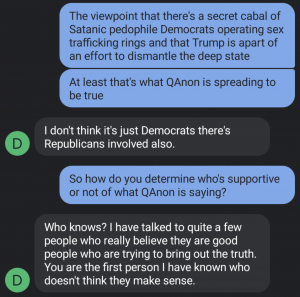Arizona has deep QAnon ties, including its politicians
Ethan Watkins was deeply troubled by the responses he was getting in his late-night text exchange last month as he pressed his friend on QAnon, the dangerous conspiracy theory that has been linked to violent acts across the nation.
Do you believe, Watkins asked, that there’s a secretive cabal of Satan-worshiping pedophile Democrats who are running a global sex-trafficking ring? And that Donald Trump is working to dismantle it?
The response came quickly: This evil global cabal is also made up of some Republicans.
Watkins pushed back. If this absurdly evil thing is being run in a bipartisan manner, how can you tell the difference between the elected officials and politicians who are involved and those who aren’t?
“Who knows?” texted back state Sen. David Farnsworth, a Mesa Republican and Watkins’s friend. “I have talked to quite a few people who really believe they are good people who are trying to bring out the truth.
“You’re the first person I have known who doesn’t think they make sense.”
In another text, Farnsworth wrote that he believes billionaire Jeffrey Epstein didn’t commit suicide in a federal prison in 2019, but was murdered because he could blow the lid off of the alleged sex-trafficking network that is at the core of QAnon.
“I have no proof. But, from all I have read, I have come to this conclusion,” Farnsworth told Watkins.
Watkins, a conservative from Mesa and political ally of Farnsworth, shared the text messages with Arizona Mirror in the hopes that it will expose just how deeply the QAnon conspiracy theory is permeating the Republican Party and the broader conservative movement.
“I think it’s dangerous, and I think it’s corrupting some honest foundations of the Republican Party and the conservative foundation that has existed for some time here in Arizona,” Watkins said. “I feel like people need to know these things about their elected officials.”
Farnsworth has often courted people with beliefs that are on the political fringe — or beyond.
In an interview this month, Farnsworth first told the Mirror that he “didn’t know anything about” QAnon. However, when presented with his text messages, he acknowledged believing in the baseless claims that the group propagates.

“My basic impression is that they are a credible group,” Farnsworth said. He added that he has never done his own research and has instead relied on the research of other “credible people” he trusts. Farnsworth wouldn’t identify those people.
Farnsworth also denied knowing that QAnon had been deemed a domestic terror threat by the FBI more than a year ago.
“Quite frankly, I don’t have time to look into things like that,” he said.
Farnsworth also stood by his claims that he believes Epstein did not commit suicide.
Farnsworth isn’t the only Arizona politician who dabbles in the conspiracy theory and is not the only tie the state has to it. Arizona’s QAnon ties run deep.
What is QAnon?
In its simplest form, QAnon is a conspiracy theory that alleges that a cabal of Satan-worshiping pedophiles are running a global sex-trafficking ring, control world governments and are trying to bring down President Donald Trump — who is himself single-handedly dismantling the cabal.
“It’s different in the aspect that it’s not just a conspiracy theory. It’s an online centralized cult,” Joseph Uscinski, a professor at the University of Miami who specializes in conspiracy theories, told the Mirror.
Each member can adopt their own beliefs and are encouraged to do their own “research,” and there are as a result a wide variety of QAnon beliefs, Uscinski said. For example, some believe that the founder of QAnon, dubbed simply “Q,” is actually JFK Jr., while others believe Q to be Trump himself. JFK Jr. died in 1999 when the plane he was flying crashed into the Atlantic Ocean.
“There is a sense of group solidarity,” Uscinski said, which makes it different from most other conspiracy theories. The result is more of a community than just a belief in an outlandish theory.
That community is also growing at a rapid pace in 2020, according to a report by the Institute for Strategic Dialogue.
The group, which tracks extremism and online disinformation, found that the membership of Facebook QAnon groups surged by 120% and engagement with those pages increased by 91% in March.
“Although QAnon has been bubbling beneath the surface for a number of years now, we found that since the start of the pandemic, QAnon conversation online skyrocketed,” Aoife Gallagher, analyst and researcher for ISD said in an email to the Mirror. “Conspiratorial thinking in general has increased as a result of the pandemic and QAnon is one of the driving factors of this, as it has turned into a vehicle for many disinformation campaigns.”
Overall, the United States was the largest producer of QAnon related content, according to the report.
Other researchers and journalists tracking QAnon have documented massive growth throughout the Spring and Summer. Marc-André Argentino, a PhD candidate at Concordia University who researches extremism, saw the number of QAnon Facebook groups increase from 60 in early March to 179 by July, with their membership spiking from 213,000 to 1.4 million. Likewise, he found that the number of “likes” on QAnon pages during the same time climbed from 400,000 to more than 900,000.
And an investigation by The Guardian found that, between June and August, the established QAnon community on Facebook grew from 3 million members to more than 4 million. At the same time, brand new groups and pages amassed more than 560,000 followers.
In August, Facebook banned 900 pages and groups tied to QAnon, and also restricted the reach of another 2,000 groups and some 10,000 Instagram pages tied to the baseless conspiracy theory. Several weeks earlier, Twitter took similar action, removing about 7,000 accounts and hiding another 150,000 from search results and trending topics.
Dangerous or not?
The FBI has labeled QAnon a domestic terror threat due to the anti-government rhetoric associated with many of its followers.
A number of its adherents have committed violence in the name of QAnon. In March 2019, a man killed a mob boss in New York because he believed the man was a member of the “Deep State” and that he wanted to help President Trump. He later appeared in court with QAnon messages scribbled onto his hand.
In Waco, Texas, last month, another QAnon supporter used her car to chase two people she believed were pedophiles; she was charged with aggravated assault and DUI.
In June, a man led police on a chase through Massachusetts and New Hampshire with his five children in the car. During a live-stream video of the event, the man discussed QAnon conspiracies.
An Illinois woman was arrested in New York City in April after she drove onto a pier with a car full of knives in an apparent attempt to reach a Navy hospital ship housing COVID-19 patients. In a live-stream of her travels, the woman threatened to kill Joe Biden over claims of sex trafficking. She also posted about QAnon on Facebook before the incident.
One of the first acts of QAnon violence happened in Arizona. In June 2018, Matthew Wright filled his homemade armored car with weapons and more than 900 rounds of ammunition and drove it onto the Hoover Dam, where he proceeded to block traffic. At one point he placed a sign on the window saying to “release the OIG report,” referencing a theory held in QAnon circles of a report that looked into former FBI Director James Comey.
“Is this about politics or mental illness?” Uscinski said. “I don’t want to say that everyone who buys into QAnon is unhealthy… (M)ost QAnon people may have elevation in these traits, but they don’t have enough to run over people or take over a dam.”
While most people who may be attracted to QAnon may have already been predisposed to fall in line with its way of thinking, Uscinski said not every adherent is going to become a violent extremist hell-bent on the overthrow of their government or storming a pizzeria.
“You have to seek this stuff out, you have to have a worldview that is copasetic with it,” Uscinski said.
The other danger that comes with QAnon is that it increases people’s conspiratorial thinking, making them more susceptible to other disinformation, said Gallagher, the researcher at the Institute for Strategic Dialogue.
“[T]his increase in conspiratorial thinking in general, is that it also brings with it a blanket distrust in information that comes from expert sources, either in the media or from those working for global institutions such as the World Health Organization,” she said. “This trend is certainly worrying and could have major implications for how we navigate through the rest of the pandemic and beyond.”
Additionally, Uscinski said that, despite that fact that many of QAnon’s biggest supporters may be leaning to the right, he doesn’t see it as a “far-right” belief.
“The fact that it is pro-Trump doesn’t make it pro-Republican or far-right in any meaningful sense,” Uscinski said. “It wants to kill a bunch of Republican leaders, too.”
QAnon also shares some beliefs with other conspiracies, Gallagher said.
“There are elements of QAnon that are very much linked to anti-Semitic conspiracy theories about the idea of a Jewish global government or New World Order attempting to take control of the world,” Gallagher said.
While Uscinski sees QAnon as not being completely tied to one ideology, Gallagher said QAnon messages are frequently being used by far-right groups.
“QAnon narratives play on the same as those pushed by far-right movements worldwide — a blanket distrust in media, institutions and governments,” Gallagher said. “We are seeing far-right movements internationally weaponizing QAnon and other conspiracy theories in order to bring people into their movements.”
Additionally, Uscinski says despite the increased attention to QAnon, widespread belief in conspiracy theories isn’t a wholly American phenomenon.
By 1975, up to 80% of Americans believed in a conspiracy theory revolving around the assisnation of President John F. Kennedy, he said.
How does Arizona fit in?
Arizona has proved to be an epicenter of sorts for QAnon activity — and is the home of a man who claims he will become Q in the future.
Austin Steinbart, also referred to as “BabyQ”, and his followers believe that the “Q” who has been leaving messages for the world is Steinbart’s future self, who is sending messages back in time so the present-day Steinbart can reveal the truth to the world.
In April, Steinbart was arrested for posting medical images and information online of NFL players that he was able to obtain while getting a brain scan. Earlier this month, he got in trouble for using a synthetic penis in an attempt to pass a drug test related to the April arrest.
But Steinbart is the tip of the Arizona Q iceberg.
There is the couple in Gilbert who fueled the conspiracy theory that is still spreading to this day that the furniture company Wayfair is engaged in sex trafficking. The Wayfair conspiracy has been thoroughly debunked, and many of the furniture listings cited by QAnon adherents were glitches in the company’s pricing algorithm or photoshopped.

Then there was the man with social media accounts full of QAnon posts who broke into the Chapel of the Holy Cross in Sedona and wrecked the church with a crowbar.
In Tucson, a group called Veterans on Patrol has been conducting armed patrols in the desert searching for child sex traffickers, and in 2018 the group even occupied a cement factory they claimed was tied to the Clintons after they claimed to have discovered a “sex camp.” The group still regularly posts QAnon related conspiracies. The “sex camp” discovered by the group was found to be an old homeless encampment that had been abandonned for some time.
Farnsworth is finishing up his final term in the Arizona Senate. His replacement will be Republican state Rep. Kelly Townsend, who has occasionally posted QAnon content on her Facebook page.
“This very well may be the answer to our question as to why,” Townsend said in a July Facebook post of a QAnon YouTube video with a flaming Q as the thumbnail.
The 47-minute-long video claims that the “virus is real but the pandemic is fake” and that “they” are working to use the virus to “establish a new world order.” Townsend has been a vocal opponent of the economic restrictions imposed to curb the spread of the coronavirus, and she has denounced mask-wearing as a public health hazard.
Townsend also follows a number of high-profile QAnon accounts on Twitter.
But unlike Farnsworth, Townsend said she doesn’t ascribe to QAnon.
“If I promoted it, it was not intentional,” she said. “I don’t support that, by any means at all.”
Townsend said that she follows accounts that like her posts on Twitter and expressed surprise that the video she shared had come from a QAnon account and that she had been following QAnon accounts on Twitter.
“I don’t necessarily look for people to follow,” Townsend said. She said that she had seen some posts about QAnon and thought the group was merely going after pedophiles. Townsend said she will always support any group that goes after pedophiles, but she is not a Q supporter.
Like Farnsworth, she also pleaded ignorance about violent incidents linked to QAnon, including the ones in Arizona, and she stopped short of criticizing the group for its outlandish beliefs.
“I don’t want to impugn a group (for) an unstable person’s actions,” she said.
Arizona’s QAnon GOP candidates
Some Arizona voters in November will be faced with candidates who openly embrace QAnon.
Longshot Republican congressional candidate Daniel Wood has spoken about his QAnon beliefs and recently had his campaign boosted by Arizona Republican Party Chairwoman Kelli Ward.
Another GOP congressional candidate running in a solidly Demcoratic district, Josh Barnett, has also shared QAnon content. On a Facebook Live event with the Arizona GOP, Barnett said his “unifying message” to voters would be ending child trafficking, adding that securing the border, improving the nuclear family and increasing school choice are his campaign planks.
Other Arizona candidates have also embraced QAnon, such as state Senate candidate Suzanne Sharer, who blamed her opponent’s criticism of her Q beliefs for a loss of followers on Twitter. In the same Facebook Live event that Barnett was on, Ward called Sharer a friend of hers and said that the “fake news” would likely try to hold Sharer’s social media past against her, but the Arizona GOP “would not let them.”
Earlier this year, two GOP lawmakers shared QAnon messages on their social media for Independence Day.
Rep. Jay Lawerence, a Republican who lost his re-election bid in the August primary, posted a message on his Twitter and Facebook accounts declaring, “Qanon Patriotic Americans who support President Trump.” He later posted another message apologizing for the post, saying he knew “practically nothing” about the movement.
State Sen. Vince Leach, a Tucson Republican, posted a political cartoon by Ben Garrison depicting President Donald Trump, his former National Security Advisor Michael Flynn and a figure whose head is a large Q marching and preparing to step on miniature figures labeled as globalists, Marxists and traitors.
Leach did not respond to requests for comment in July or for this story.


